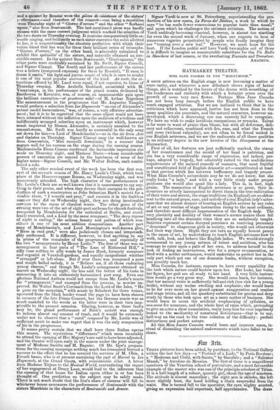HA.YMARKET THEATRE.
MISS JANE COOMBS IN THE "HONEYMOON."
A Goon actress on the English stage is now becoming a matter of some rarity, and whenever a new debutante shows signs of better things, she is watched by the lovers of the drama with something of the tenderness and curiosity with which a botanist pores over the growth of some very rare flower. Perhaps Miss Jane Coombs has not been long enough before the English public to have much engaged attention. But we are inclined to think that in the criticisms which have appeared, justice has not been done to the many qualities she possesses, and the natural resources, however un- developed, which a discerning eye can scarcely fail to recognize. We have no wish to make invidious comparisons or remarks. Talent is far more in want of praise than blame, but with all deference, deli- cacy and refinement, combined with fire, ease, and what the French call verve (without vulgarity), are not often to be found united in our English actresses, and we see the rudiments of all these qualities in no ordinary degree in the new heroine of the Honeymoon at the Haymarket.
First of all, her features are just sufficiently marked, the stamp of her countenance and the mould of her head is patrician, and she has a very considerable range of expression, not indeed, per- haps, adapted to tragedy, but admirably suited to the multifanous requirements of the natural comedy of manners, that most fruitful and uncultivated field of English dramatic art—uncultivated at least in that portion which lies between buffoonery and tragedy proper. What Miss Coombs's antecedents may be we do not know, but she really looks "a lady," and with a very little study under proper guidance she would also speak like a lady. This is, in fact, lugh praise. The mannerism of English actresses is so great, their in- structors so utterly incompetent to direct them in the true cultivation of their voice and accent, the stage traditions (in England) are so abhor- rent to the natural grace, ease, and melody of a real English lady's utter- ance that we almost despair of hearing an English actress by any rules of art or any routine of stage instruction rising to the most ordinary, and therefore most difficult impersonation of the English lady. The very plasticity and docility of their woman's nature makes them fall headlong into all the dramatic vices they are so sedulously taught. Satirists represent certain decayed peeresses as receiving pecuniary " douceurs" to chaperone girls in society, who would not otherwise find their way there. Might they not turn an equally honest penny in the cause of art, by undertaking to teach English actresses how to walk, talk, look, and behave like English ladies. We would strongly recommend to any young actress of talent and ambition, who has courage to enter upon a path of her own, to address herself to the task of finding an instructress, who for a proper remuneration, or fired with a nobler enthusiasm, would undertake to perfect her in the only part which not one of our dramatic hacks, without exception, can possibly teach her.
Miss Coombs, for instance, appears to have every capability for the task which nature could bestow Upon her. Her looks, her voice, her figure, her gait are all ready to her hand. A very little instruc- tion would go a very great way. She would soon learn, for instance, that her natural voice is sufficiently full and rich (too rich for a young bride), without any undue swelling and emphasis; she would learn to be for ever more on her guard against exaggeration and routine and stage tricks, and all the quackery substituted for genius and deep study by those who look upon art as a mere matter of busiuess. She would learn to scout the artificial emphasizing of syllables, as non-sense for nonsense, and the whole host of rules which; pretending to give an actor a clear enunciation, really keep him for ever hopelessly bound to the mediocrity of unnatural distinctness—that is to say, half-way on the road to the true solution of the difficulty: perfect distinctness and perfect nature.
All this Miss James Coombs would learn and improve upon, in- stead of discarding the natural endowments which have fallen to her share.






























 Previous page
Previous page